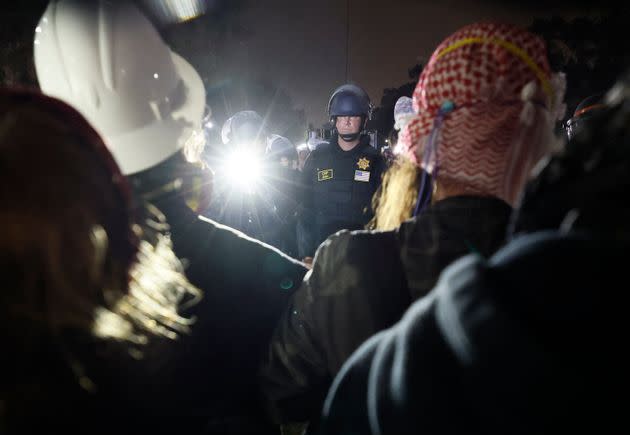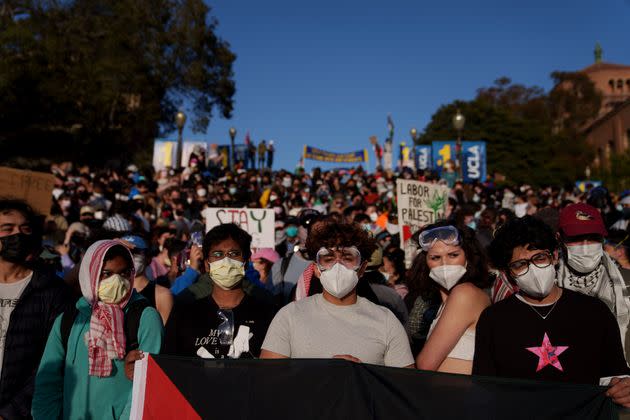The House Passed A Bill To Fight Antisemitism. Here’s Why Critics Call It Misleading.
A bill expanding the definition of antisemitism was passed on Wednesday by a bipartisan vote in the House — but despite the legislation on its face claiming to help federal officials better protect Jewish students on school campuses, critics say it is misleading and will only serve to crack down on the free speech rights of students currently protesting Israel’s ongoing military offensive in Gaza and the U.S. government’s continued support.
The House voted 320-91 in support of the Antisemitism Awareness Act, establishing a broader definition of antisemitism to enforce federal anti-discrimination laws. The bill would codify the intergovernmental International Holocaust Remembrance Alliance’s definition of antisemitism into the legal framework established by the 1964 Civil Rights Act, which bars discrimination based on shared ancestry, ethnic characteristics or national origin.
“Antisemitism is a certain perception of Jews, which may be expressed as hatred toward Jews. Rhetorical and physical manifestations of antisemitism are directed toward Jewish or non-Jewish individuals and/or their property, toward Jewish community institutions and religious facilities,” the IHRA’s working definition of antisemitism, as adopted in 2016, reads.
“Manifestations might include the targeting of the state of Israel, conceived as a Jewish collectivity,” the IHRA adds. “However, criticism of Israel similar to that leveled against any other country cannot be regarded as antisemitic.”
Seventy Democrats and 21 Republicans voted against the House bill, which now goes to the Senate. If passed and then signed into law by President Joe Biden, the bill would expand what counts as illegal ethnic discrimination to include anything covered by the IHRA’s definition of antisemitism.
A sponsor of the bill, Rep. Mike Lawler (R-N.Y.), said in a statement Wednesday that the bill “gives teeth to federal anti-discrimination laws to go after those who attack their Jewish peers.”
“Politics should never get in the way of the safety of the students,” he said.
Kenneth Stern, the professor who drafted the IHRA’s working definition of antisemitism, warned Congress in 2017 that if government bodies “enshrine this definition into law, outside groups will try and suppress — rather than answer — political speech they don’t like. The academy, Jewish students and faculty teaching about Jewish issues, will all suffer.”

The Biden administration and Congress have faced increased scrutiny from within the U.S. for their continued support of Israel’s siege in Gaza, which began after Hamas militants killed about 1,200 people on Oct. 7 in Israel and took roughly 250 hostage. The Israeli offensive has since killed more than 34,000 Palestinians in Gaza and displaced at least 80% of the region’s residents, has destroyed important infrastructure like schools, hospitals and religious institutions and has brought on a famine.
If the bill is enacted, the Department of Education could use its expanded definition of antisemitism to stifle the ongoing antiwar protests at college campuses across the U.S., according to the bill’s opponents.
In recent weeks, students from multiple faiths, races and ethnicities have begun camping out on school grounds, calling for the U.S. to stop funding Israel’s military campaign in Gaza and for their universities to divest from companies financially tied to Israel.
Witness descriptions and footage from the campus protests portray the demonstrations to be generally peaceful — though the arrival of counterprotesters and police, who have been recorded assaulting and arresting students and professors, has caused them to turn violent. Law enforcement agencies, often called in by university administrators, have so far arrested about 2,000 protesters, according to a tally by The Associated Press.
“Instead of focusing on protecting the free speech rights of Palestinian, Arab, Muslim and Jewish students who face harassment and attacks during recent student-led protests on campus, House lawmakers attempted to adopt in law the anti-free speech IHRA definition,” said Robert McCaw, director of government affairs for Muslim civil rights group CAIR.
“Misleading definitions like these are being weaponized right now to suppress and silence Muslim, Jewish, Palestinian and allied communities’ student-led protests against the Israeli government’s war crimes in Gaza.”

Last week, the American Civil Liberties Union called on House lawmakers to vote against the bill, saying federal law already bans antisemitic discrimination and harassment. Dozens of universities in the U.S. already face civil rights investigations by the DOE over allegations of antisemitism and Islamophobia.
The bill instead ”would likely chill free speech of students on college campuses by incorrectly equating criticism of the Israeli government with antisemitism,” the ACLU said in a letter sent Friday to the House.
Others who oppose the bill — including some Democrats, free speech advocates and pro-Palestinian groups — have also pointed out the dangers of equating criticism of the Israeli government with hatred of a religion or culture.
“Speech that is critical of Israel alone does not constitute unlawful discrimination,” Rep. Jerry Nadler (D-N.Y.) said Tuesday. “By encompassing purely political speech about Israel into Title VI’s ambit, the bill sweeps too broadly.”
IfNotNow, a Jewish American organization that opposes the Israeli occupation, called the bill “fearmongering by political and communal leaders and right-wing organization AIPAC,” referring to the massive pro-Israel lobbying group.
“As American Jews, we see this McCarthyite crackdown on speech under the guise of Jewish safety as extremely dangerous,” IfNotNow national spokesperson Eva Borgwardt said after the bill’s passage. “We know that Jewish safety cannot come at the expense of Palestinian freedom. Jewish safety and Palestinian safety are inextricably intertwined.”
“This bill would criminalize criticism on college campuses in the name of protecting American Jews, but its impact would be the opposite.”

